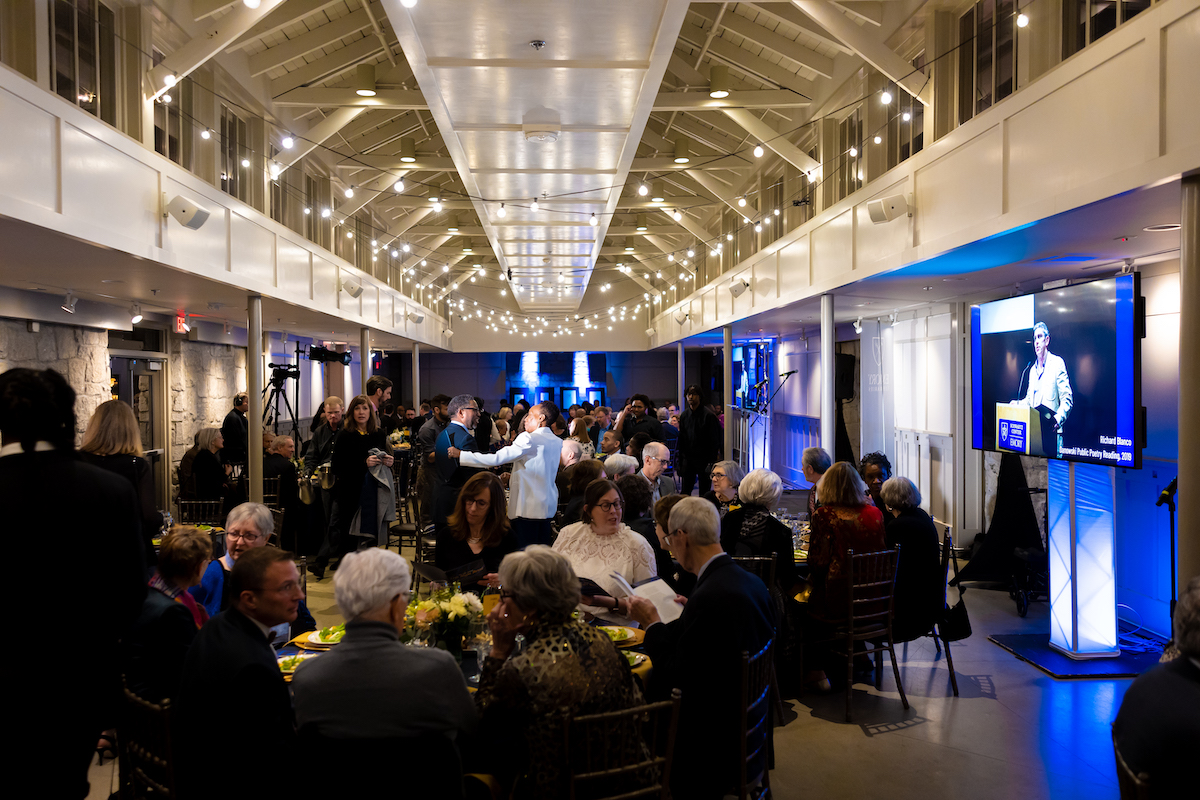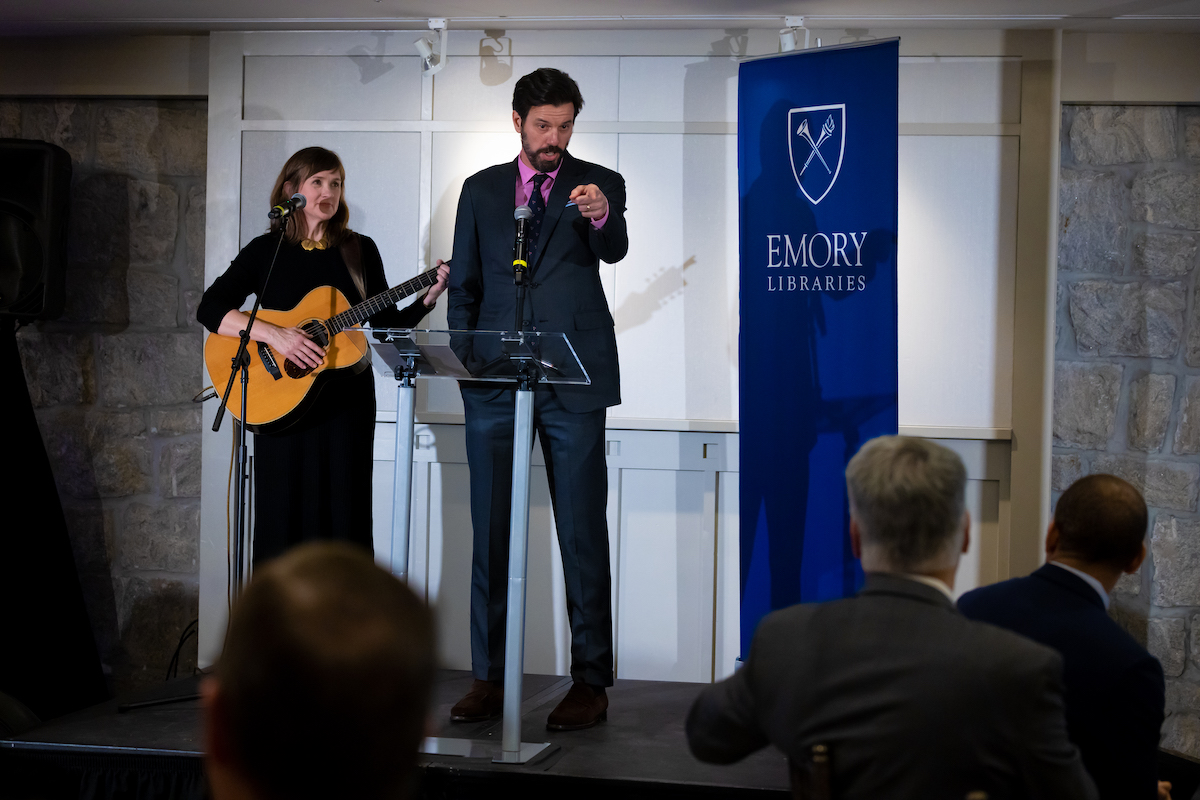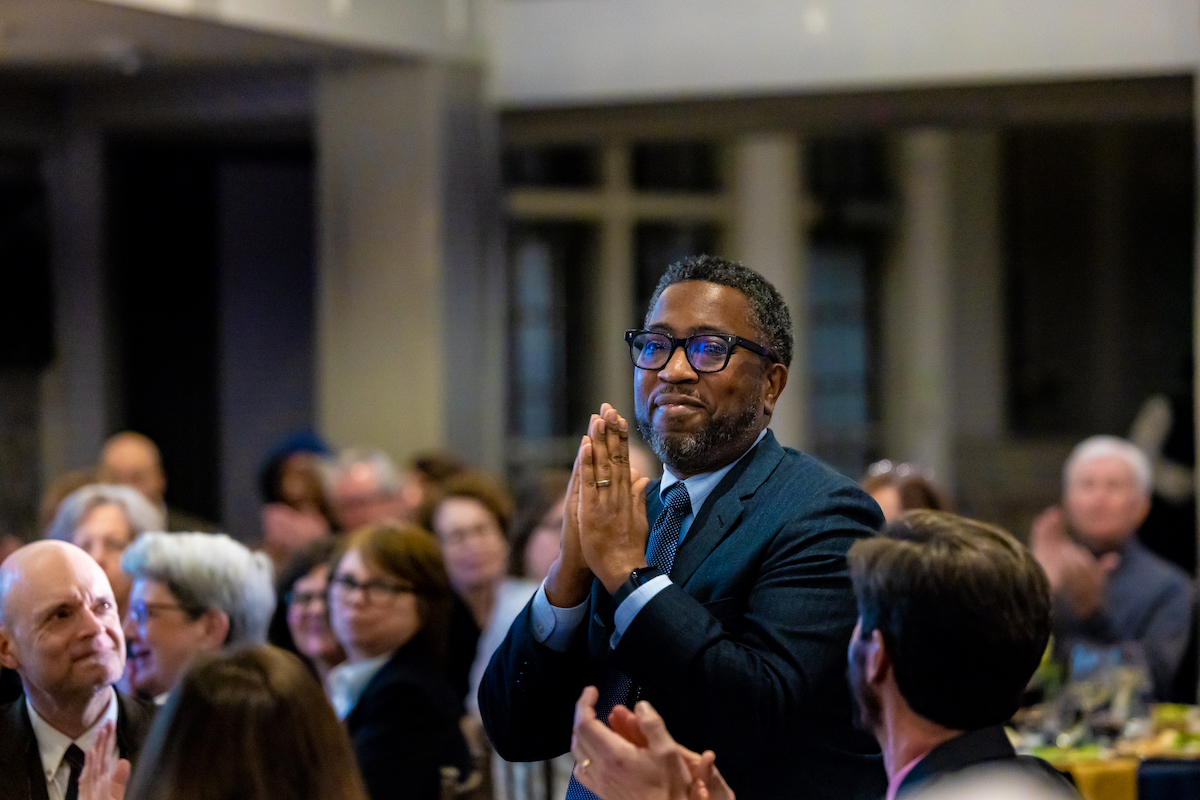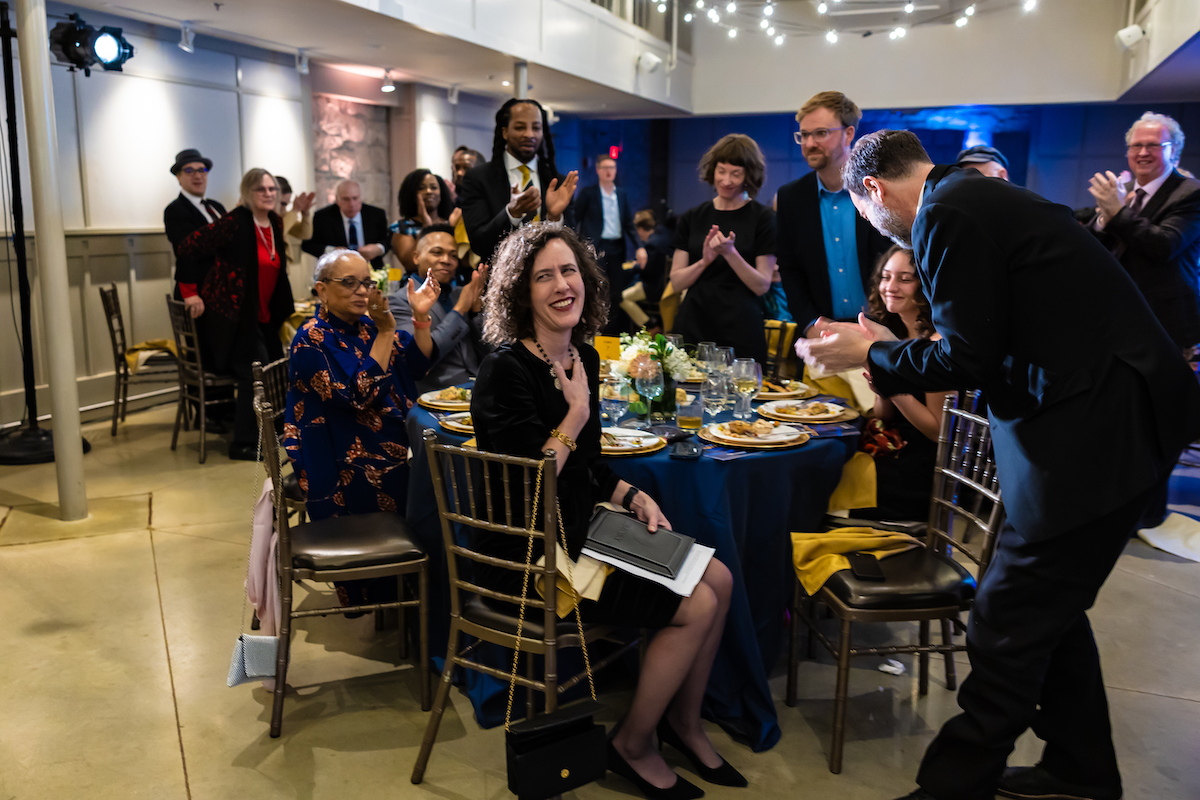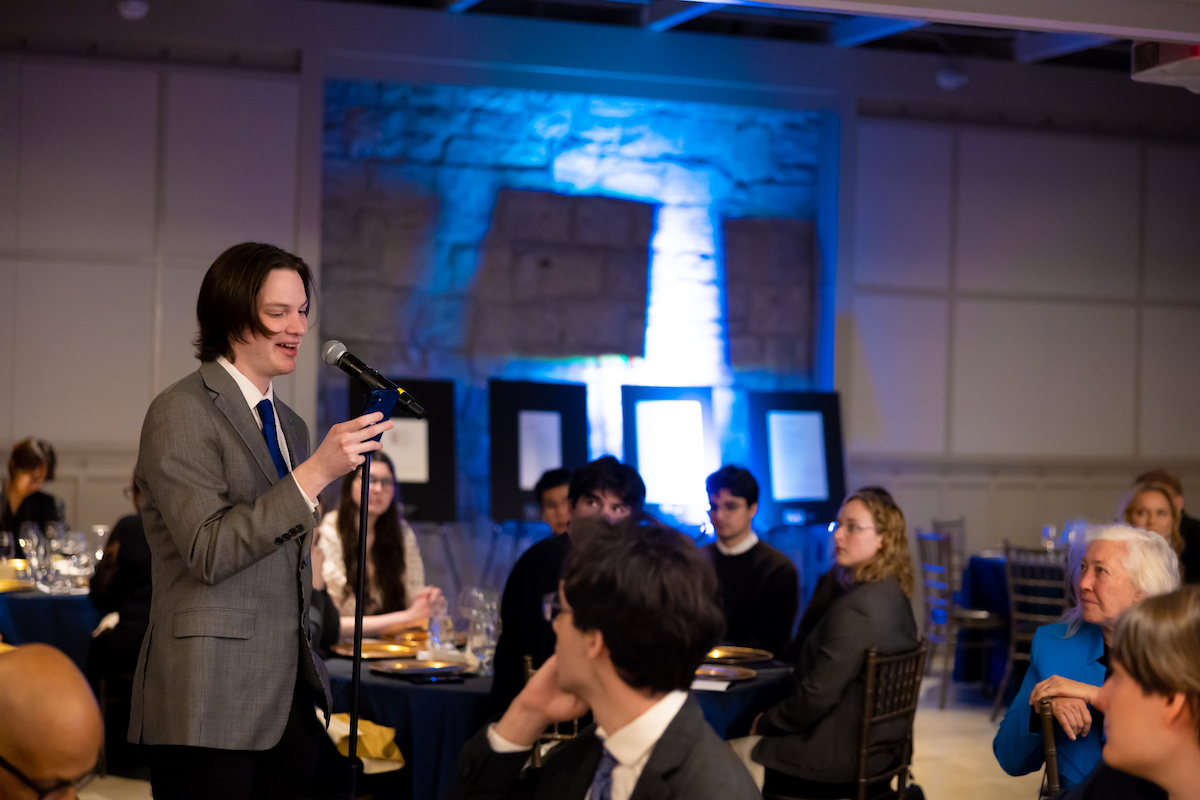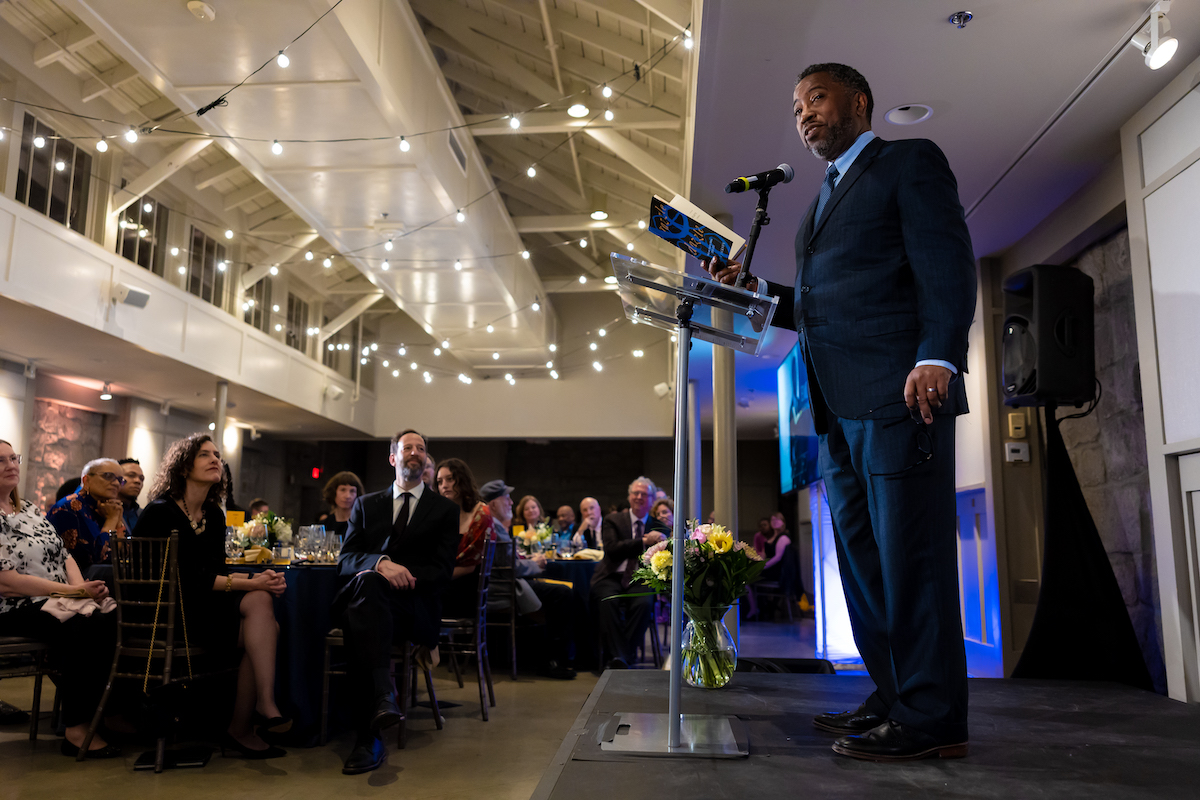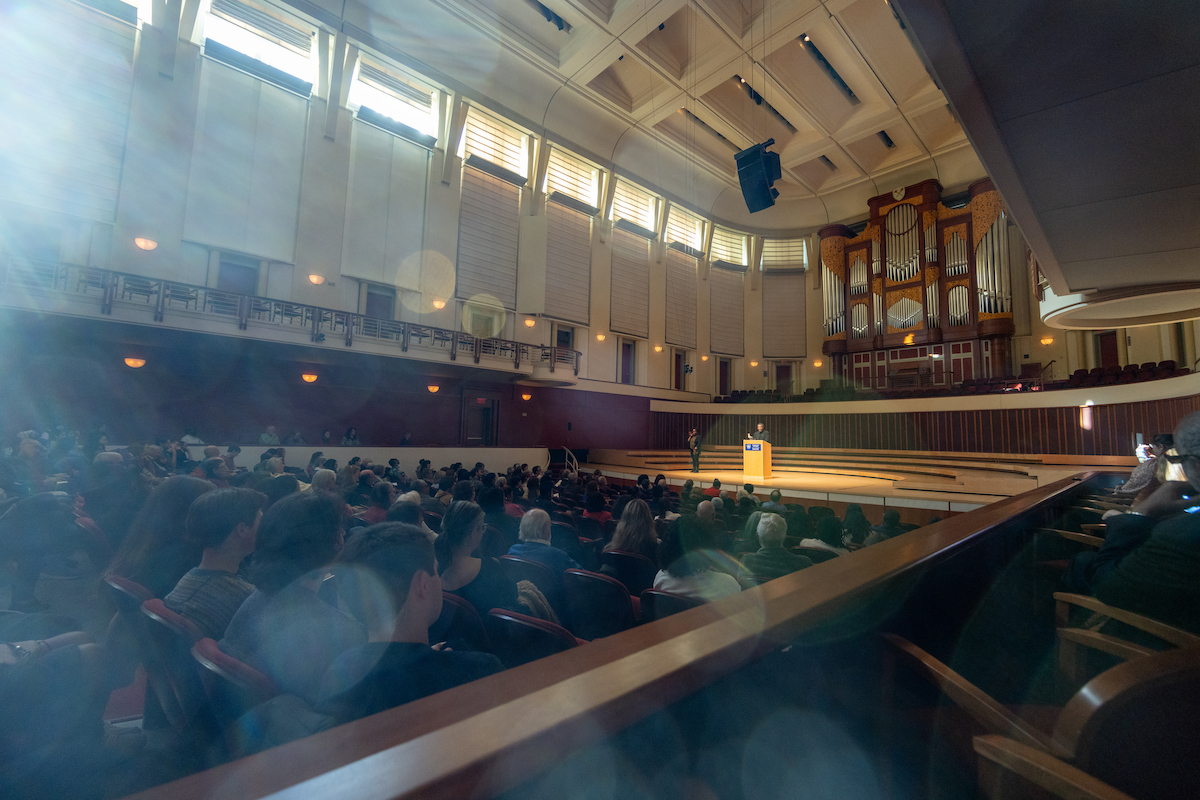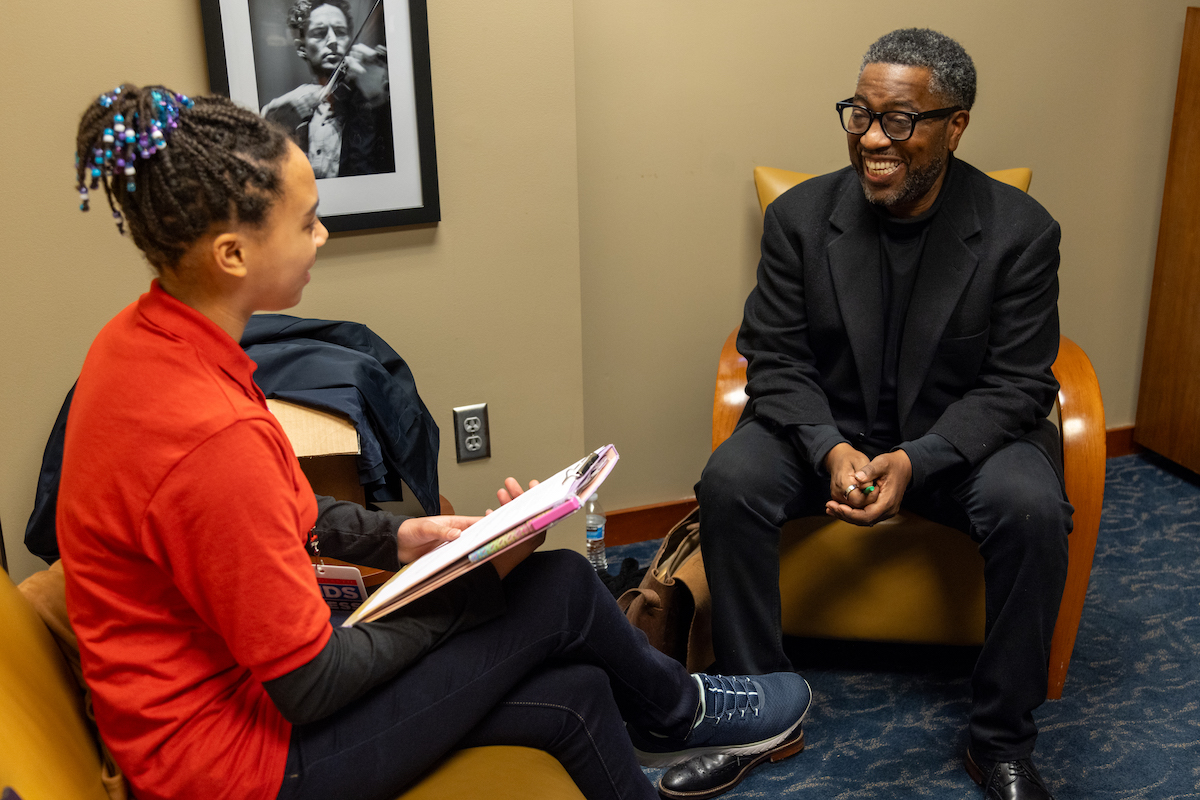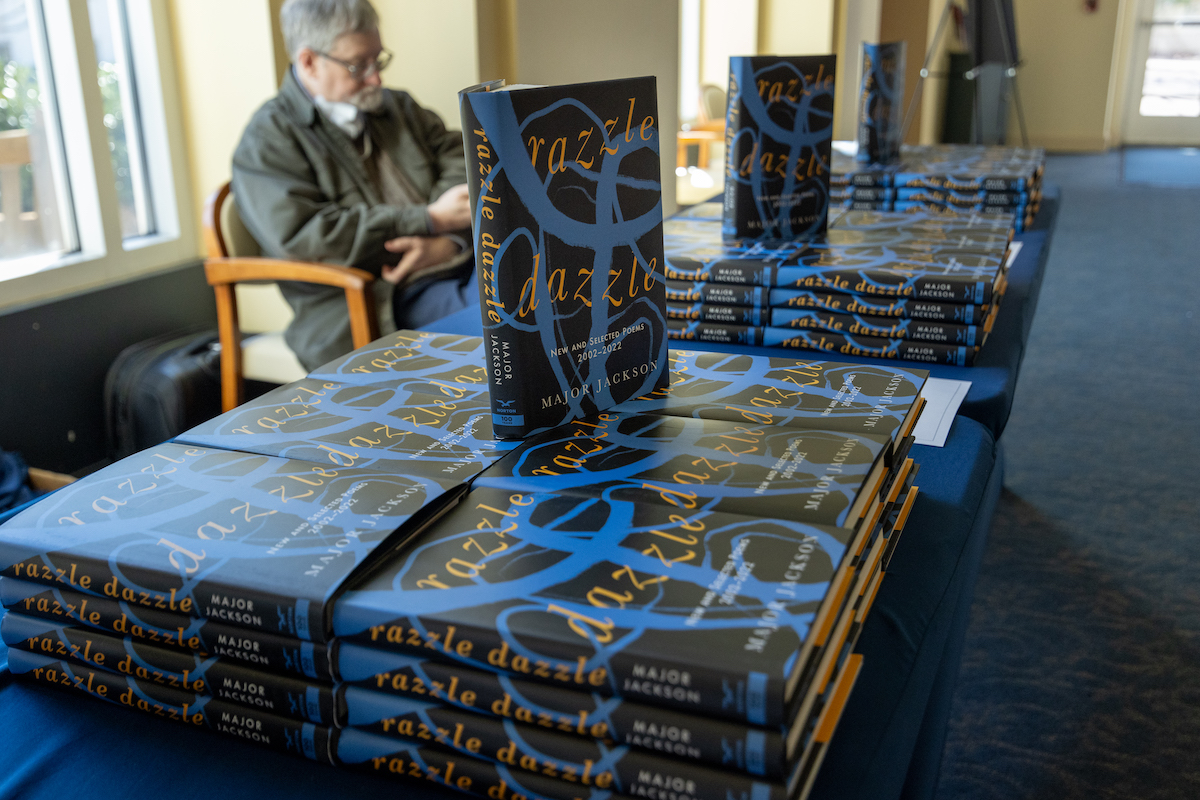The recent visit of poet Major Jackson occasioned a “double Major,” a conceit Jackson would appreciate, for that is the title of one of his verses.
On Feb. 17 and 18, Major did double duty, headlining the 12th Night Revel, the annual fundraiser for the Stuart A. Rose Manuscript, Archives, and Rare Book Library, which holds a collection of Jackson’s papers. He then gave a community reading the next day in the Schwartz Center for Performing Arts.
In his poem “Double Major,” Jackson gives his writing self a hard time, observing:
He knocks repeatedly on the bolted door to his imagination. Tragically, he believes that he can mend his wounds with poetry. |
Judging by audience reactions on both days as Jackson read from “Razzle Dazzle: New and Selected Poems, 2002-2022,” those knocks were music to many ears.
‘A library humming like a swarm of gnats’
Jackson is the Gertrude Conaway Vanderbilt Chair in the Humanities at Vanderbilt University. His earlier poetry collections include “The Absurd Man” (2020), “Roll Deep” (2015), “Holding Company” (2010), “Hoops” (2006) and “Leaving Saturn” (2002), which won the Cave Canem Prize.
The poetry editor of the Harvard Review and host of the poetry podcast “The Slowdown,” Jackson is a member of the American Academy of Arts and Sciences. He has received fellowships from the Academy of American Poets, John S. Guggenheim Foundation, National Endowment for the Arts and the Radcliffe Institute for Advanced Study at Harvard University, as well as having been awarded a Pushcart Prize and a Whiting Award.
Before Jackson took the stage at the 12th Night Revel, administrators, faculty, staff and students read poems from W. B. Yeats, Ada Limón, Walt Whitman, Mary Oliver, John Keats, Nikki Giovanni, Phillis Wheatley, Hart Crane and others. Some readers shared original works.
Valeda Dent, vice provost of libraries and museum, welcomed the crowd, saying: “We are here to recognize the importance of the Rose Library to the campus and community.” Acknowledging that she had been thinking about climate change and its impact on future generations, Dent read from Jane Hirshfield’s “On the Fifth Day.”
President Gregory L. Fenves called the Rose Library “a crown jewel, one that serves as a vital and widely used resource for our students, scholars and visitors from around the world.” He chose to read “Crossing” by Jericho Brown, Charles Howard Candler Professor of English and Creative Writing and interim director of the Creative Writing Program.
Emory College junior Michael Dehn thanked Tiphanie Yanique, professor of English and creative writing, for “reintroducing me to the power of words,” then recited former U.S. National Youth Poet Laureate Kara Jackson’s lyrics from the song “Why Does the Earth Give Us People to Love?”
Chief revelers Joseph Crespino, Jimmy Carter Professor of History, and singer/songwriter Caroline Herring Crespino kept the audience on its toes.
Contending that “even debate or argument can be a form of revelry,” Joseph Crespino suggested conversation prompts to discuss at each table. They were: (1) Bob Dylan had no business winning the Pulitzer Prize for Literature; (2) Irish literature, meh; and (3) In the battle of the poet laureates, who emerges victorious, Ada Limón or Natasha Trethewey?
Caroline Herring Crespino signaled her love of Irish literature by singing and playing guitar as she performed the Yeats poem “The Song of Wandering Aengus.”
When the director of the Rose Library, Jennifer Gunter King, was introduced by Lisa Macklin, associate vice provost and university librarian, she received a standing ovation for her accomplishments over five years. In March, King will begin a new leadership role with the Boston University Libraries.
Jackson, King noted, was a member of the influential Dark Room Collective, formed in Boston in 1988 to establish community for African American writers. The Rose Library already has the papers of members Natasha Trethewey, Kevin Young, Tracy K. Smith and Major Jackson, and is looking to add to its collections to enable future research.
As King thanked the audience for its support of the Rose Library, she likened it to “writing a love letter from the past to the future, with all of us standing here together in the in-between space.” She went on to read a poem by her father — one that had never been read, which she found in his papers after his death.
Heather Christle, assistant professor of English and creative writing and faculty advisor to the 12th Night Revel, introduced Jackson, citing a line from Jackson’s poem “My Children’s Inheritance,” which reads: “A library humming like a swarm of gnats.”
“I want to start with that line,” Christle noted, “because I know that the people in this room have heard that hum, the urgent murmur that rises from bookshelves and archival boxes, the voices of the living and dead and the language with which they continue to speak. It seems that hum has followed Jackson, and he the hum, from an early age and not only in libraries but all over town.”
Clearly touched to be in a place where poetry is prized, Jackson began his reading in a humble spirit — choosing to read Nobel Laureate Seamus Heaney’s “Digging,” about the excavations of his father and grandfather as well as his own as a writer. A significant influence on Jackson, Heaney is being honored at the upcoming Ellmann Lectures, taking place at the Schwartz Center March 3-5.
Funny, humble and prone to conceits
The community reading Major gave on Feb. 18 was part of the Raymond Danowski Poetry Library Reading Series, currently in its 19th year. Acquired in 2004, the Raymond Danowski Poetry Library consists of 85,000 examples of rare and first editions of modern and contemporary poetry and thus is one of the largest, most significant collections of verse in the world.
Tayari Jones, Charles Howard Candler Professor of English and Creative Writing, introduced Jackson. Friends for more than 20 years, Jones noted Jackson’s “growth as a poet, professor, critic, truth teller, beauty builder and passionate advocate for poetry and the arts. His six extraordinary volumes make clear his insight, wit, fearlessness and capacious heart. He lives at the crossroads of history and possibility as a son of Philly and a man of the world.”
Jones cited Jackson’s ability to connect with listeners, describing a friend who is “not a poet, a professor or an artist. He is a Black man who gets up every day, drops his kids off at school and goes to work. He stumbled upon the ‘Slowdown’ podcast and was hooked.”
On full display as Jackson read were qualities that John Freeman of LitHub noted when he said that “no American poet wears his genius as lightly.”
Jackson didn’t take long to amuse the audience. After announcing “my work is here for reading and research,” he said, “by the way, I’m still writing. You should know that.”
Before reading “Lovesick,” he confessed: “My wife is a poet, so that makes February 14th quite challenging in my house. You can’t show up with a greeting card; you have to have written a poem.”
Poking fun at poetry’s solemn rites, Jackson told the audience that although writing an ode and sonnet are “part of the job description for being a poet,” he had not ever written an ode. As he set out to right this wrong in “Razzle Dazzle,” he couldn’t decide on an object — “Should it be socks or cats?” he asked himself — so he wrote “Ode to Everything.”
Moving effortlessly between the serious and the lighthearted, the poem thanks the ice cream cone for “building a paradise in my mouth,” the “yellow circle in a traffic light for illustrating patience” and “my neighbor who sits vigil beside the dying far away from the lights.”
Acknowledging his “addiction to long conceits,” Jackson offered an example in another new poem, “It Must Be the Supermarket in Me,” which begins:
It must be the supermarket in me, all lit from the inside, full of wide aisles and thoughtful shelf-stocking where you’ll find my feelings and memories. That’s why on the outside I look so ordered and put together. My inner supermarket contains an old-world butcher shop with no trace of the slaughter. |
Jackson told of having lived in Vermont and, for 15 years, observing a grueling travel schedule to teach in the creative writing program of New York University. In so doing, he waged a perpetual battle with himself about whether to chat with his seatmates.
“If I wanted to sleep on the early flight from Vermont, all I would need to say, when asked by my neighbor what I did for living, was ‘I’m a poet.’ That shuts down all conversation,” he joked.
But there came a day when that answer didn’t work.
“One gentleman was persistent,” Jackson said. “I told him I was a poet and just as I was folding my jacket into a pillow, he said, ‘Why?’ Startled, I had no answer. As soon as I landed, I went to my office and composed ‘Why I Write Poetry.’”
Each line begins with the word “because” and ends:
Because I have been on a steady diet of words since the age of three. |
Regarding tender ages, Jackson told the audience that he had given an interview before the reading to an up-and-coming reporter, Skye, who writes for Scholastic Kids Press and is the daughter of Oxford College faculty member Erica Oduaran. In the article she went on to publish on Jackson, Skye reveals his advice to young poets: “read, read and read.”
Jackson shared with Skye wisdom he had gleaned from the poet Etheridge Knight — namely, that a triangle necessarily forms between the poet, the poem and the people.
“A poem is not complete until it enters the community, until it is read and absorbed,” Jackson said. A recording of his reading is available for those still eager to join that community.
As the afternoon light faded and the applause rose, more than a dozen poems had gone out into the world — absorbed and appreciated.

